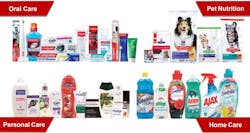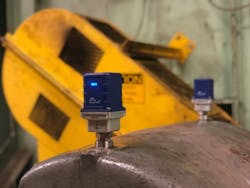Colgate-Palmolive Focuses on Machine Health to Improve Supply Chain Operations
From toilet paper shortages and soaring lumber rates affecting home prices to long-delayed shipments of household appliances and furniture, numerous supply chain concepts once reserved to procurement and logistics professionals have become almost common knowledge to people outside industry. Likewise, a focus on the close connection between production operations and their affect on supply chains is gaining more adherents.
As noted in the recent Automation World article, "Supply Chain Optimization and the Future of Industry": The growing need for end-to-end visibility is particularly relevant for plant-level operators and systems integrators because it often requires more integration between supply chain software and manufacturing execution systems (MES) to extract granular data such as equipment health and material availability that can help to more accurately gauge a facility’s true capacity. Collecting and communicating this data to supply chain partners in real time can assist them in more effectively coordinating their own procurement and inventory activities.
Colgate-Palmolive is feeding this wireless sensor data into Augury’s machine health software platform. Pruitt pointed out that this enables Colgate-Palmolive’s machine data to be compared with machine data from more than 80,000 other machines connected to the Augury platform around the world.
“That massive analytical scale brings us insights on how to optimize the performance of equipment and make ever-smarter choices on how and where we deploy it,” Pruitt said. “What’s possible only gets more compelling as this AI solution harnesses more data to create better health outcomes for our machines and our business.”
Sensor data
Approaching the development of this machine health monitoring system at Colgate-Palmolive required investigation into the best sensor type for this job. According to Pruitt, “Bluetooth sensors require a person with a smart phone to collect the data, and wired sensors come with a high price tag. But the wireless sensor solution we’re now using automates that data collection and analysis—monitoring vibration, magnetic flux (energy use) and surface temperature. When issues arise, reliability professionals remotely alert and collaborate with our plant teams as needed.”
The sensors used in the Augury Machine Health system were retrofitted onto Colgate-Palmolive’s existing equipment to capture vibration, temperature, and magnetic data and transmit it to the Augury platform.
We prevented the drive from failing due to overheating, which would’ve stopped the tube production line and incurred replacement costs. We figure the savings at 192 hours of downtime and an output of 2.8 million tubes of toothpaste, plus $12,000 for a new motor and $27,000 in variable conversion costs.Pruitt explained that Colgate-Palmolive uses Augury’s sensors on a variety of rotating equipment, such as homogenizers, mixers, pumps, case packers, fillers, cartoners, conveyors, and agitators.
Sensor data is transmitted via Wi-Fi to the Augury Machine Health platform in the cloud. With the data in the system, Augury’s AI algorithms can diagnose machine malfunctions to create what Augury calls the “baseline.”
Improving yield, reducing risks
According to Augury, its Machine Health system doesn’t just “automatically diagnose machine malfunctions, it tells users how and when to fix them.” The company claims its software goes beyond the capabilities of the average predictive maintenance system by providing a real-time snapshot of a machine’s health and immediately alerting users of machine faults, their severity, and what actions to take to prevent a failure. This also allows for specific machines at highest risk of failure to be prioritized and helps users better understand the risks of downtime.
“Although early diagnosis of problems is a key advantage here, there are additional savings from extending use of equipment past what would be typical preventative maintenance schedules,” said Pruitt. “Instead of stopping production as a matter of course, say, every six months, we monitor the near real-time health and performance of our machines and if all is well, we can safely keep them running nine months or longer. This has increased our available manufacturing capacity by allowing higher production volumes, which has been invaluable during the COVID-19 crisis.”
Pruitt also noted that supply chain interruptions and capacity requirements were reducing the available capital for strategic growth at Colgate-Palmolive, driving the company to explore new systems, like Augury’s Machine Health, to improve yield, lower operating costs, and mitigate manufacturing risks. “The goals of the Machine Health program were to help improve output, reduce downtime, and reduce MRO (maintenance, repair, and operations) spending by moving from preventive to predictive maintenance,” he said.
Notable improvements
Providing a specific example of how Augury’s Machine Health system has helped Colgate-Palmolive, Pruitt noted that the system’s AI detected rising temperatures in the drive of a tube maker and alerted the plant team. “Upon inspection, they discovered a problem with the motor’s water cooling system,” he said. “By getting it quickly resolved, we prevented the drive from failing due to overheating, which would’ve stopped the tube production line and incurred replacement costs. We figure the savings at 192 hours of downtime and an output of 2.8 million tubes of toothpaste, plus $12,000 for a new motor and $27,000 in variable conversion costs.”
Accoring to Pruitt, mutiple Colgate-Palmolive plants currently use Machine Health. “For example, six Hill's Pet Nutrition plants have deployed the technology. Within four months of deployment, the cost savings from Machine Health had paid for the annual Machine Health program in all six plants,” he said.
Based on its experience thus far with the system, Hill’s is starting to combine machine insights with quality insights to predict which pet food formula will run best on which extruder, a process which will influence future product development, Pruitt said.
Leaders relevant to this article:




